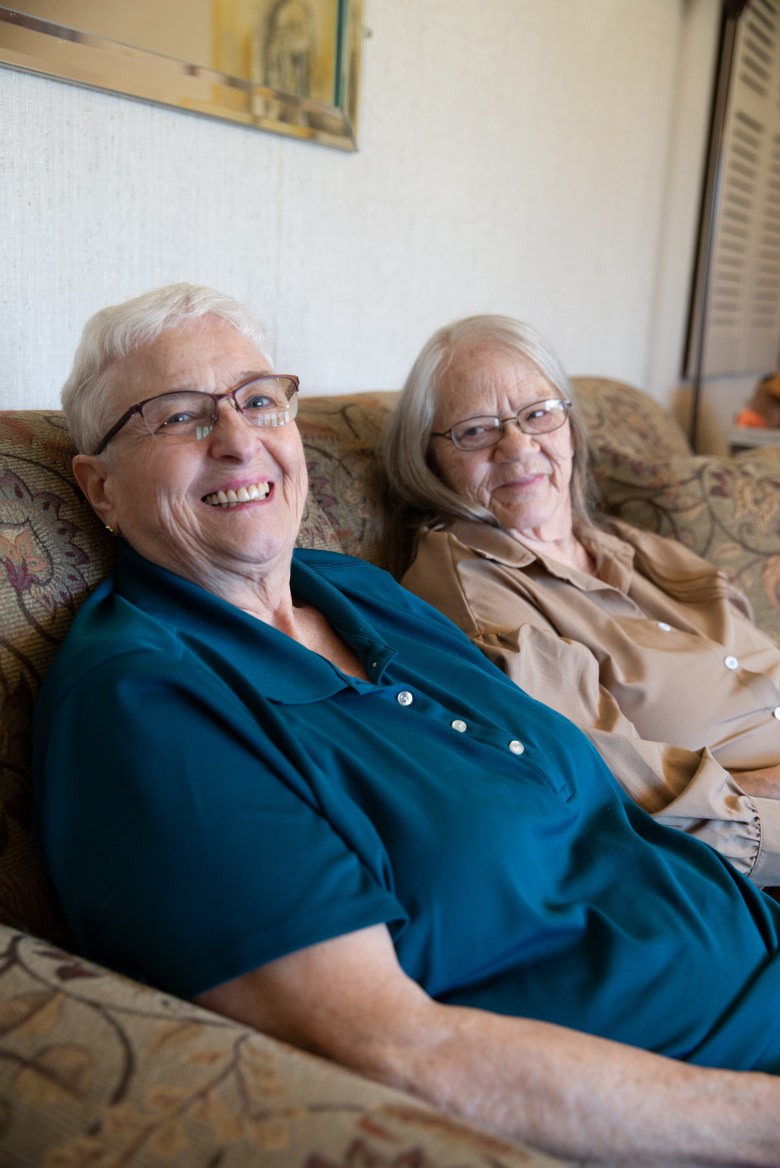by Naina Rao and Justice Marbury | May 26, 2023

Carol Thompson, left and 74, serves as caregiver for her partner Elizabeth Tilden, who’s 76. Tilden has a moderate form of Alzheimer’s disease.
Credit: Justice Marbury
Carol Thompson’s journey to caregiving began with an 18-day cross-country trip. She drove from Rochester, New York, to California, to pick up her partner and best friend, Elizabeth Tilden. Tilden, 76, has a “moderate” form of Alzheimer’s disease.
Thompson, 74, has assumed the role of caregiver since 2021, as Tilden’s daughter lives in Sweden.
When it comes time to look for assisted living facilities, the couple hopes the facility has LGBTQ ally partnerships and a large community presence to support them.
“I think as far as the community, if you’re stuck at home, which doesn’t matter, gay, straight, or otherwise, if you’re stuck at home, what are you going to do? You need that connection. I desperately need to be around people. That’s who I am,” Thompson said.
The history of anti-LGBTQ+ sentiment reflected in U.S. laws and policies has created a stigma that’s caused painful experiences for LGBTQ+ patients seeking healthcare.
That fear was heightened in the HIV/AIDS epidemic of the 1980s. But in 2022, post-COVID-19 vaccinations, LGBTQ+ adults have an additional concern: aging alone.
The assumed caregivers of older adults, immediate or close relatives, are often unavailable to members of the gay and lesbian community, explained Scott Fearing, a community activist and educator on LGBTQ+ issues at the University of Rochester.
“If you look at elders in the world and who cares for them, it’s usually children, grandchildren, siblings, something like that,” said Fearing. “And oftentimes, for LGBTQ seniors, those connections don’t exist. There aren’t children. There aren’t places to turn to.”
The U.S. healthcare system has long stigmatized LGBTQ+ patients, said Meki Singleton, a doctoral candidate studying gerontology at the University of Southern California.
In the past, Singleton said, would-be healthcare providers denied treatment to HIV/AIDS patients. Today, medical discrimination looks like denying treatment of patients due to their sexual orientation or identity, she said.
“Having that historical nature of being discriminated against… you may not be the first in line to want to access these [healthcare] services,” Singleton pointed out.
Support to elders in Michigan
The Michigan LGBTQ+ Elders Network (MiGen) is trying to tackle challenges faced by older LGBTQ+ adults during the pandemic, which has illuminated gaps and disparities in services.
MiGen saw a massive upswell of the need for basic assistance, programming, and social connection as the pandemic hit for the older LGBTQ adults it serves. It now has a whole pillar dedicated to direct services for older adults.
What the organization offers broadly falls into two buckets: education and direct services. The training and education department works directly with adult care providers, said MiGen executive director Angela Gabridge.
“We do culturally responsive training and education for nurses, nursing, home administrators, social workers, receptionist, clerical staff — basically anyone in that older adult care space,” Gabridge said.
MiGen also works with Michigan’s area agencies on aging, long-term care facilities, and healthcare systems, she said.

“We have a food assistance and tech assistance program, friendly caller reassurance, we have social programming both in-person and virtual opportunities,” said Gabridge.
This year, the organization launched a community navigator pilot program that pairs older LGBTQ+ adults and their caregivers with community members who work to assist them with any challenges or hurdles they face. The members are part of the LGBTQ+ community and are positioned to help, Gabridge said.
The navigators can step in to assist with housing or provide resources, such as when an LGBTQ+ person says they are being bullied at their long-term care facility, she said. Even when MiGen is working with allies or people who want to be supportive, it’s often difficult when there’s an absence of significant experience within the LGBTQ+ community, or when allies come from a cultural background that views personal questions as offensive or invasive.
“That’s one challenge that oftentimes folks don’t think of,” Gabridge said.
Back in Rochester, Thompson said she would prefer to age in a community of other LGBTQ+ seniors.
“I love it, because I can be there and be myself and not worry about pronouns or anything else,” Thompson said. “And I don’t have to worry about somebody asking about my gender identification, or any of that stuff.”
Thompson said she believes there is a major need for supportive housing and programs catered to older adults like her.
“There’s just not a lot of social outlets here for senior gays.”